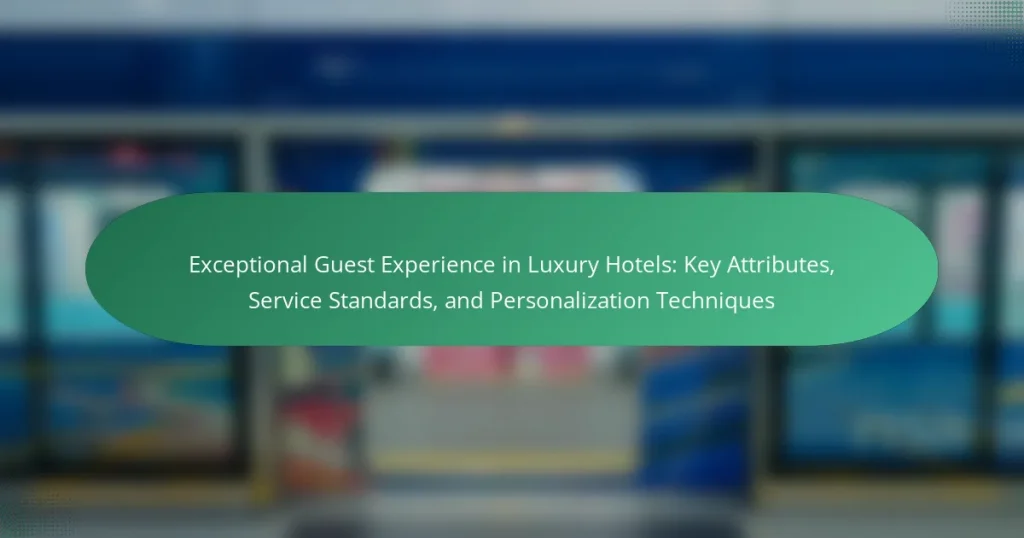Exceptional guest experience in luxury hotels is characterized by personalized service, meticulous attention to detail, and superior amenities. Key attributes include customized greetings, tailored recommendations, and anticipatory service, all supported by high staff-to-guest ratios that ensure individual attention. Exclusive access to facilities enhances the overall experience, while a focus on exquisite design and ambiance creates a memorable atmosphere. Research indicates that personalized experiences significantly influence consumer behavior, with 80% of consumers more likely to engage when offered tailored services. This article explores these essential service standards and personalization techniques that define luxury hotel experiences.

What defines an Exceptional Guest Experience in Luxury Hotels?
An exceptional guest experience in luxury hotels is defined by personalized service, attention to detail, and high-quality amenities. Luxury hotels prioritize the unique needs and preferences of each guest. This includes customized greetings, tailored recommendations, and anticipatory service. Exceptional experiences often feature exclusive access to facilities and services. High staff-to-guest ratios ensure personalized attention. According to a study by Deloitte, 80% of consumers are more likely to make a purchase when offered a personalized experience. Luxury hotels also focus on creating a memorable atmosphere through exquisite design and ambiance. These elements collectively contribute to an unforgettable stay.
How do luxury hotels differentiate themselves in guest experience?
Luxury hotels differentiate themselves in guest experience through personalized service, exclusive amenities, and attention to detail. They employ highly trained staff who anticipate guest needs and preferences. This includes personalized greetings, tailored recommendations, and bespoke experiences. Luxury hotels often offer unique services such as private concierge, in-room dining with gourmet options, and spa treatments.
The ambiance is meticulously curated, featuring high-end decor and tranquil settings. Many luxury hotels provide exclusive access to events or experiences, enhancing the overall stay. According to a 2021 study by Deloitte, 80% of luxury travelers prioritize personalized experiences. This focus on customization and service creates memorable stays that distinguish luxury hotels from standard accommodations.
What are the key attributes of an exceptional guest experience?
Key attributes of an exceptional guest experience include personalized service, attention to detail, and seamless communication. Personalized service ensures that guests feel valued and understood. Attention to detail enhances comfort and satisfaction in every aspect of their stay. Seamless communication allows for efficient problem-solving and enhances overall satisfaction. According to a study by the Cornell University School of Hotel Administration, personalized experiences significantly increase guest loyalty and satisfaction ratings.
How do guest expectations shape the luxury hotel experience?
Guest expectations significantly shape the luxury hotel experience by influencing service delivery and overall satisfaction. High expectations lead luxury hotels to prioritize personalized service and attention to detail. Guests expect exceptional amenities, such as high-quality bedding and gourmet dining options. These expectations drive hotels to invest in staff training and superior customer service practices. Research indicates that 70% of luxury travelers seek unique experiences tailored to their preferences. This demand compels hotels to innovate and offer bespoke services. Meeting these expectations results in positive reviews and repeat business. Consequently, guest expectations are integral to maintaining a competitive edge in the luxury hospitality market.
Why are service standards crucial in luxury hotels?
Service standards are crucial in luxury hotels because they ensure a consistent and high-quality guest experience. These standards define the expectations for service delivery, which is vital in an industry where customer satisfaction is paramount. High service standards lead to increased guest loyalty and positive word-of-mouth. According to a study by McKinsey & Company, companies that excel in customer experience can achieve revenue growth of 5 to 10 percent above their market. Furthermore, luxury hotels rely on service standards to differentiate themselves in a competitive market. Consistency in service enhances brand reputation and builds trust with guests. In summary, service standards are essential for maintaining excellence and achieving business success in luxury hospitality.
What specific service standards are commonly upheld in luxury hotels?
Luxury hotels commonly uphold high service standards that focus on exceptional guest experiences. These standards include personalized service, where staff anticipate guest needs and preferences. Attention to detail is crucial, ensuring that rooms are immaculate and amenities are of the highest quality. Prompt and courteous communication is maintained, with staff trained to respond quickly to requests.
Concierge services are often available to assist guests with reservations, transportation, and local recommendations. Privacy and discretion are prioritized, allowing guests to feel comfortable and secure. Additionally, luxury hotels frequently offer exclusive access to facilities, such as private lounges or pools.
These standards are reinforced by industry benchmarks, such as the Forbes Travel Guide and AAA Five Diamond ratings, which evaluate service quality and guest satisfaction.
How do service standards impact guest satisfaction and loyalty?
Service standards significantly influence guest satisfaction and loyalty in the hospitality industry. High service standards ensure that guests receive consistent, quality experiences. This consistency leads to increased guest satisfaction, as customers feel valued and appreciated. Satisfied guests are more likely to return and recommend the hotel to others. A study by the Cornell University School of Hotel Administration found that service quality directly correlates with customer loyalty. Specifically, a 1% increase in service quality can lead to a 2% increase in customer loyalty. Therefore, maintaining high service standards is essential for fostering long-term relationships with guests.
How does personalization enhance the guest experience in luxury hotels?
Personalization enhances the guest experience in luxury hotels by tailoring services to individual preferences. This approach creates a sense of exclusivity and attention. Guests feel valued when hotels recognize their names, preferences, and past stays. For instance, customized welcome amenities can significantly improve satisfaction. Data shows that personalized experiences can increase guest loyalty by up to 70%. Furthermore, personalized services, such as tailored dining options, meet specific dietary needs and enhance overall enjoyment. Luxury hotels often utilize advanced technology to gather guest data for improved personalization. This leads to memorable experiences that guests are likely to share through positive reviews.
What personalization techniques are most effective in luxury hotels?
Effective personalization techniques in luxury hotels include tailored guest experiences, preference tracking, and personalized communication. Tailored guest experiences involve customizing services based on individual guest profiles. This can include room preferences, special requests, and personalized welcome amenities. Preference tracking utilizes data analytics to monitor guest choices and behaviors. This allows hotels to anticipate needs and enhance satisfaction. Personalized communication involves direct engagement with guests through customized messages. This can include birthday greetings, personalized offers, and follow-up surveys. Research indicates that personalized experiences significantly increase guest loyalty and satisfaction, as noted in the study by McKinsey & Company, which found a 10-15% increase in revenue for hotels that implemented effective personalization strategies.
How can hotels gather data for effective personalization?
Hotels can gather data for effective personalization through various methods. They can use guest surveys to collect preferences directly from customers. Online booking systems can track guest behavior and choices. Loyalty programs can provide insights into repeat guest preferences and spending habits. Social media monitoring can reveal guest interests and feedback. Mobile apps can gather data on guest interactions and preferences in real-time. In-room technology can collect usage data to tailor services. Analytics tools can process data to identify trends and personalize marketing efforts. These methods enable hotels to enhance guest experiences by tailoring services to individual needs.
What are the challenges in delivering an exceptional guest experience?
Delivering an exceptional guest experience faces several challenges. High guest expectations require consistent quality and personalized service. Staff training is essential but often inadequate, leading to inconsistent service delivery. Communication gaps between departments can result in service failures. Limited resources may restrict the ability to enhance guest experiences. Additionally, managing guest feedback effectively is crucial for continuous improvement. Technology integration poses challenges, as not all staff may be tech-savvy. Finally, maintaining a unique brand identity while catering to diverse guest preferences can complicate service delivery.
How do luxury hotels address common obstacles in service delivery?
Luxury hotels address common obstacles in service delivery through personalized service, staff training, and technology integration. Personalized service involves understanding guest preferences and anticipating needs. Staff training ensures employees are equipped with skills to handle diverse situations. Technology integration streamlines processes and enhances communication. For instance, mobile apps allow guests to request services quickly. Additionally, luxury hotels often implement feedback systems to identify service gaps. Research shows that 75% of luxury hotel guests value personalized experiences highly. These strategies collectively enhance guest satisfaction and loyalty.
What strategies can be implemented to overcome these challenges?
Implementing personalized service strategies can effectively overcome challenges in luxury hotel guest experiences. Training staff to understand individual guest preferences enhances service quality. Utilizing technology, such as customer relationship management systems, allows for tailored communication. Regular feedback collection from guests identifies areas for improvement. Developing a strong brand culture focused on exceptional service fosters employee engagement. Collaborating with local businesses can enhance guest offerings and experiences. Implementing these strategies can lead to increased guest satisfaction and loyalty, which are critical in the competitive luxury hotel market.
How can hotels measure the success of their guest experience initiatives?
Hotels can measure the success of their guest experience initiatives through various metrics. Guest satisfaction surveys provide direct feedback on guest perceptions. Net Promoter Score (NPS) gauges the likelihood of guests recommending the hotel. Online reviews and ratings reflect guests’ overall experiences. Repeat booking rates indicate loyalty and satisfaction levels. Social media engagement shows guest sentiments and interactions. Staff performance metrics can also highlight the effectiveness of service delivery. These methods provide quantifiable data to assess and improve guest experiences.
What metrics are most relevant for evaluating guest satisfaction?
The most relevant metrics for evaluating guest satisfaction include Net Promoter Score (NPS), Customer Satisfaction Score (CSAT), and Customer Effort Score (CES). NPS measures the likelihood of guests recommending the hotel to others. A high NPS indicates strong guest loyalty and satisfaction. CSAT assesses guests’ satisfaction with specific aspects of their stay. It is usually collected through surveys immediately after service interactions. CES evaluates how easy it was for guests to resolve issues or complete tasks during their stay. Research shows that satisfied guests are more likely to return and recommend the hotel. According to a study by McKinsey, improving customer experience can lead to a 20% increase in customer satisfaction and a 15% increase in revenue.
How can feedback be effectively utilized to improve services?
Feedback can be effectively utilized to improve services by systematically collecting, analyzing, and implementing it. Gathering feedback through surveys, reviews, and direct communication allows hotels to understand guest needs. Analyzing this feedback identifies trends and areas needing improvement. Implementing changes based on feedback demonstrates responsiveness and enhances guest satisfaction. For example, a study by the Cornell University School of Hotel Administration found that hotels that actively use guest feedback see a 10% increase in customer satisfaction scores. Regularly revisiting feedback ensures continuous improvement and adapts to changing guest expectations. Thus, a structured approach to feedback leads to better service quality and enhanced guest experiences.
What best practices can luxury hotels adopt for an exceptional guest experience?
Luxury hotels can adopt personalized service, attention to detail, and seamless technology integration for an exceptional guest experience. Personalized service includes remembering guest preferences and providing tailored recommendations. Attention to detail involves maintaining high standards in cleanliness, ambiance, and amenities. Seamless technology integration enhances convenience through mobile check-ins, smart room controls, and digital concierge services. According to a study by Deloitte, 80% of consumers are more likely to make a purchase when brands offer personalized experiences. Implementing these practices can significantly elevate guest satisfaction and loyalty.
How can staff training enhance service quality in luxury hotels?
Staff training enhances service quality in luxury hotels by equipping employees with essential skills and knowledge. Trained staff can provide personalized service that meets high guest expectations. This training includes understanding luxury standards and anticipating guest needs. Effective training programs improve communication skills, leading to better guest interactions. Research shows that well-trained staff can increase customer satisfaction by up to 20%. Additionally, training fosters a strong service culture within the hotel. Employees who feel confident in their roles are more likely to deliver exceptional service. Ultimately, staff training directly correlates with positive guest experiences and hotel reputation.
What role does technology play in personalizing the guest experience?
Technology plays a crucial role in personalizing the guest experience. It enables hotels to collect and analyze guest data effectively. This data includes preferences, past stays, and feedback. By leveraging this information, hotels can tailor services to individual needs. For instance, personalized room settings can be adjusted based on previous guest preferences. Additionally, mobile apps allow guests to request services instantly. Automation in communication enhances responsiveness to guest inquiries. According to a study by Cornell University, 70% of guests prefer personalized experiences, highlighting the importance of technology in meeting these expectations.
Exceptional guest experience in luxury hotels is characterized by personalized service, attention to detail, and high-quality amenities. The article explores how luxury hotels differentiate themselves through customized experiences, exclusive access to services, and meticulous staff training. Key attributes such as seamless communication and the impact of guest expectations on service delivery are examined. Additionally, it discusses the importance of service standards in fostering guest loyalty and satisfaction, as well as effective personalization techniques and the role of technology in enhancing the guest experience. The article concludes with best practices for maintaining excellence in luxury hospitality.




